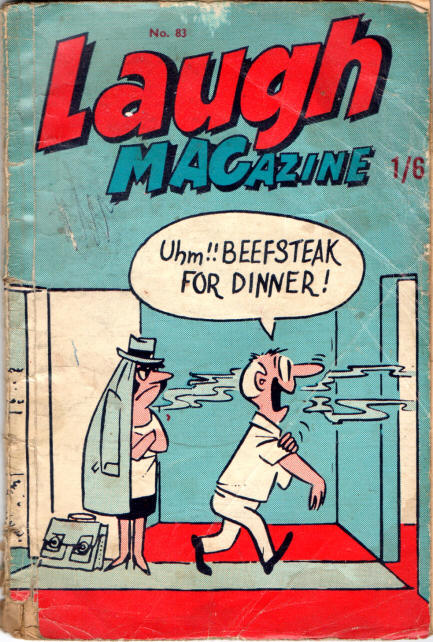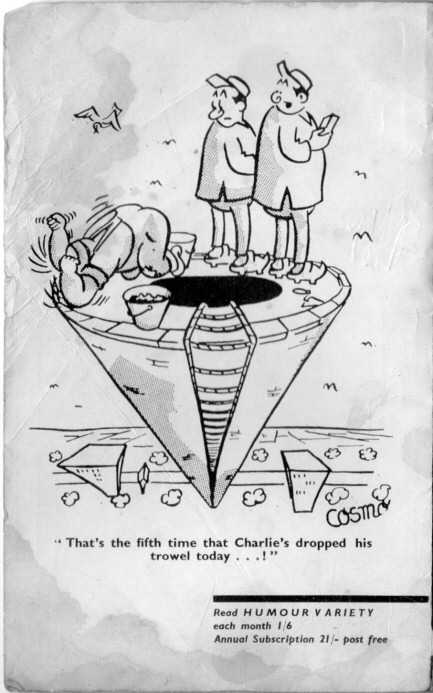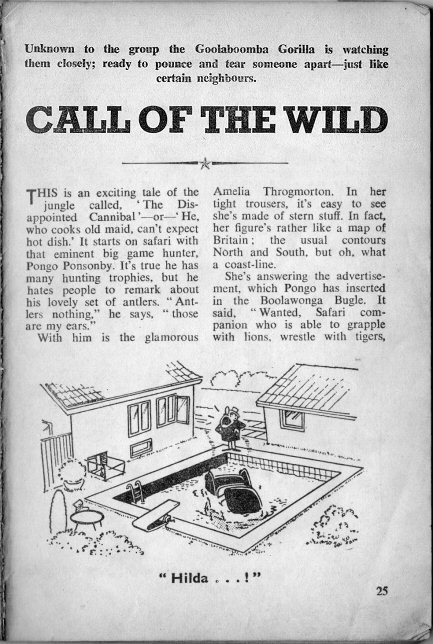 This Is Not A
BLOG!
This Is Not A
BLOG!
Date: 08/11/21
Laugh? I'm Sure I Did
One of the long-term results of an inability to throw things out is that one can come across an item which takes you right back to when you first had it, or when you last read it, played it, played with it, and so on.
I have seldom thrown books out, for example. I have been known to from time to time, obviously, otherwise I would have long since been buried under a mountain (or, at the very least, a substantial hillock) of paper. But discarding books has always been a practice characterised by extreme reluctance on my part; chucking them out seems to be less than a step short of burning them and - whilst I am reasonably sure that my ejected volumes have gone to, say, charity shops and whatnot - the act of doing so has always given me a feeling of slight unease, even if the books are of no value or consequence to me. Like, for instance, Michael Moorcock's The Eternal Champion; or the complete Bill, The Galactic Hero series, having found it - despite an encomium to them from no less a figure than Terry Pratchett - to be consistently unamusing, be it the Harry Harrison solo-written first volume or the subsequent efforts he co-authored.
(Perhaps for another time a discourse on why I have never been able to get on with Moorcock's fiction, despite my wanting to simply in order to keep up with the friends of my younger days who practically worshipped it).
Searching on the top shelf of my library (the deeply pretentious description I give to the smallest of my three bedrooms) for something else, I came across this:

(I also have issue No. 94, but the cover of that was scrawled upon by Yer primary-school-age Judge and isn't fit to reproduce on a reputable website such as this one).
I don't remember how they came into my possession at all at this distance in time. All I am sure of is that it must have been at the tail end of the nineteen-sixties, when I would have been no more than seven years old. I can be certain of that much because of the pre-decimal price on the cover (1/6 was the equivalent of 7½ New Pence; probably about £84.50 today).
Of Laugh Magazine I have been able to discover virtually nothing, even in these info-stuffed days. I came across a passing reference in a piece about a similar magazine from the period in question, but there was no hyperlink to follow; and you try to get any useful result from putting "Laugh Magazine" into your search engine of choice. All I could find was a set of six issues for sale on what appears to be an auction site in Slovenia.
This scarcity is a little odd bearing in mind that - on the evidence of issue numbers alone - the magazine must have run for at least eight years. Perhaps the essentially throwaway nature of the publication has militated against its preservation to a very large degree, and only the most anally-retentive could possibly have kept any copies except by chance or inertia.
Beyond that, all I know is that - according to the blurb at the bottom of the back cover - it was published "...for the proprietors at 1, Furnival Street, London EC4 [...] by CAHILL & CO., LTD...", that it was also printed and/or published in Ireland by the same firm, and that it also had agents in South Africa and Italy. Who the 'proprietors' actually were is not vouchsafed to us at any point.
What is clear is that a significant proportion of the content (especially the copious cartoons) had been imported from the United States: left-hand-drive cars; those peaked-cap cop helmets with the big badge at the front; wives called Mildred and husbands called Henry; that sort of giveaway.
The text element of the magazine was also peppered with references which were likely to be opaque even to adults on this Septic-Tank Isle at that time (and indeed since): quotations from Bishop Fulton J. Sheen or Dr. Tom Dooley, for example; or references in jokes to 'city hall' or 'vacation'.
But to be fair, these all seem merely to be a means of padding rather than full-scale cultural imperialism (I'm sure that the great Alan Coren could have told us of the difficulty of filling a humorous publication, and he had to do it every fortnight). There are plenty of clear UKanian references in the rest of the magazines, including quotes from John Barbirolli and Lord Boothby and jokes about the Board Of Trade or about a passenger on a London bus.
There are sections entitled Quick Quips, Words Of Wisdom and Hot Chest Nuts (sic), which contain the sort of material one would expect, but there are longer pieces as well. These vary from the elaborate and somewhat artless re-telling of shaggy-dog tales to the sort of squibs which were the standard fare of English magazine humour at any time between about 1890 and 1975. The quality of the work obviously varies, and the overall impression is of items which wouldn't quite have passed muster for Punch during that period.
This leads me to suspect something about the authors of these pieces. The names on the by-lines above or below each story are unknown to me (and searching doesn't bring anything to light either), and I rather fancy that Robert McSkimming, Bruce Tucker, Eve Nash and Jon Holliday (to name but a few) were either second-division humourists trying to get their work noticed (or just get paid for it) or members of the first rank who were cashing in their own slush piles without being jeered at by their peers and shunned at fashionable dinner parties just inside the comforting orbit of the North Circular.
Many of the sentiments and attitudes displayed in the humour are very much of their time of course, but I've always thought it rather unjust that - latterly - we are expected to view the expressions of times past entirely through the lens of today's social or ideological conformities. It's simply not fair in my view to make judgements on the writers of previous ages as if we not only expected them to predict the way that the perceptions of the population at large would change in subsequent decades, but to utter mea culpas (even from beyond the grave) for their woeful lack of foresight.
And so Laugh Magazine contains stories, jokes and cartoons featuring (in no particular order): grasping wives; dizzy young girls; ineffectual husbands; even to cannibals with bones in their hair trying to boil a white man in khaki clothing and a pith helmet. Do not, I urge you, condemn their authors and drawers out of hand unless you can see fifty years into your future.
That's not to say that there isn't anything worthwhile here, though. As I said, I came across these magazines when I was about seven or eight years of age and - as is often the case with formative experiences - some of what I read in them has stayed determinedly with me these past fifty years. From the occasional aperçu such as:
"Some people's minds are like concrete; thoroughly mixed up and permanently set"
via the observation that:
"The narrower a man's mind, the broader his statements"
to:
"Living in the past has one thing in its favour; it's cheaper"
they embody certain eternal and essential truths which have always been useful to me when trying to sift through the dross of latter-day life.
Some of the cartoons have stayed with me too, including what may be my favourite single-panel cartoon of all time:

There's another influence too, I think, and this time in terms of the way I look at language. Take a look at this scan of the beginning of a story credited only to 'J.M.R.' from issue No. 94:

Having been conditioned up to that age to read text in single-column format, I was struck by the obvious Dadaist potential of having two columns, but of reading them across from one into the other...
(I wouldn't have known 'Dadaism' from Dick Dastardly at that time, of course; this is a rationalisation in retrospect of something which at the time simply made me giggle. That precocious, I wasn't).
...to create wonderful dissonances and reconfigurations, such as:
k
"The Dis-tight trousers"
(almost Joycean, that one) and:
"It's true he has a coast-line"
and:
"...which Pongo has inserted his lovely set of antlers"
Had the pieces been intended to be read in this way, I would have included Burroughs and Gysin in my speculations as to the real authors, but I think they were probably too busy banging each other in Tangier at the time.
It was this experience (no dear, I mean 'reading the two colums across', not 'shagging a weird American in North Africa'; again, I wasn't that advanced and outré), along with exposure to the more surreal elements of formal verbal humour from the likes of The Perishers, Ken Dodd and - a little while later - The Burkiss Way, which set my own tastes and preferences for the rest of my life.
Not a bad legacy for a long-forgotten publication, I think.



 This Is Not A
BLOG!
This Is Not A
BLOG!











